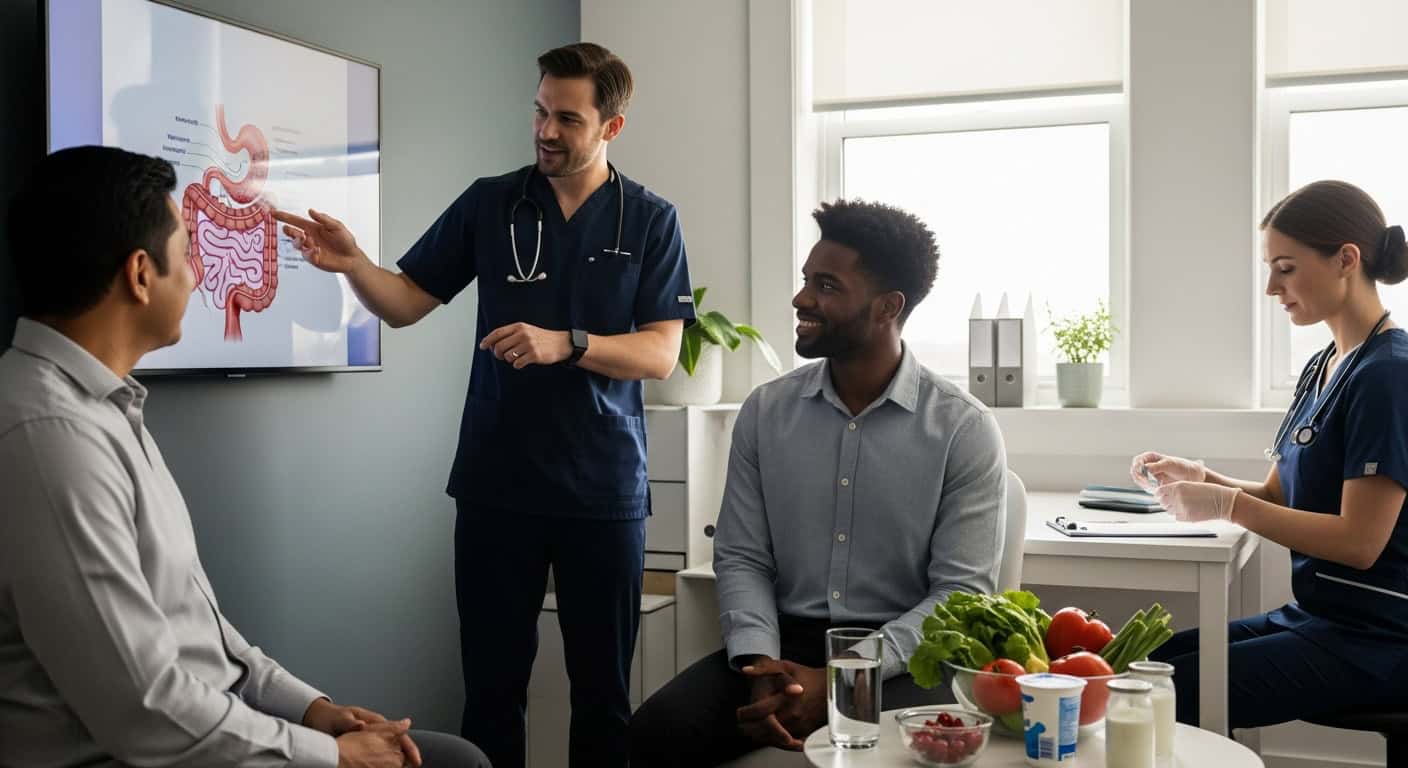
How to Detox Your Liver Kidneys and Pancreas Naturally Today
Discover how to detox your liver kidneys and pancreas naturally with a proven step-by-step guide, ensuring holistic wellness and lasting health improvements safely.
Contact USA/Canada Toll Free ( 1 (800) 917-4461
Register or Login

Stomach parasites quietly wreak havoc around the world every single day. More than 3.5 billion people globally are affected by intestinal parasites each year and many never realize the source of their stomach problems. Most people expect parasites to be rare or limited to particular countries. In reality, they are hiding in your water, produce, and maybe even your pet’s fur, turning even the healthiest routines into unexpected risks.
| Takeaway | Explanation |
|---|---|
| Recognize symptoms of stomach parasites. | Symptoms include diarrhea, abdominal pain, weight loss, fatigue, nausea, and vomiting. Identifying these early is crucial for treatment. |
| Consult a healthcare professional for diagnosis. | Self-diagnosis is not reliable. A medical expert can conduct necessary tests for accurate identification of parasites. |
| Explore conventional medication options. | Prescribed medications like albendazole and metronidazole effectively eliminate parasites. Adherence to the treatment plan is vital for success. |
| Implement dietary changes for prevention. | Eating probiotics, high-fiber foods, and cooking meats properly can help avoid infections. Hygiene also plays a crucial role in prevention. |
| Maintain good hygiene practices. | Regular handwashing and ensuring water safety are essential defenses against parasites. Clean living environments further help reduce infection risks. |
Stomach parasites represent a hidden health challenge that can silently disrupt your body’s normal functioning. These microscopic invaders can enter your system through contaminated water, food, or poor hygiene practices, causing a range of uncomfortable and potentially serious health complications.
Recognizing the symptoms of stomach parasites is crucial for prompt identification and effective treatment. Centers for Disease Control and Prevention highlights that parasitic infections can manifest through various signs, many of which are often mistaken for common digestive issues.
Key symptoms of stomach parasites include:
Some parasites like Giardia can cause more specific symptoms such as bloating, greasy stools, and significant intestinal discomfort. Mayo Clinic notes that these symptoms can range from mild to severe, depending on the type of parasite and individual immune response.
Individuals with compromised immune systems, children, elderly people, and those with chronic health conditions are particularly vulnerable to more intense parasitic infection symptoms. Traveling to regions with limited sanitation or consuming raw or undercooked foods can significantly increase your risk of contracting these unwelcome guests.
If you experience persistent digestive issues or suspect a parasitic infection, consulting a healthcare professional for accurate diagnosis and targeted stomach parasite treatment is essential.
Navigating the complex world of stomach parasites requires professional medical expertise. While self-diagnosis can be tempting, only a qualified healthcare professional can accurately identify and recommend appropriate treatment for your specific parasitic infection.
National Institutes of Health emphasizes the critical importance of professional medical evaluation for parasitic infections. A comprehensive diagnostic approach involves several key steps:
Healthcare professionals utilize sophisticated diagnostic techniques that go far beyond basic symptom recognition. Microscopic examination of stool samples allows doctors to identify specific parasitic organisms with remarkable precision. Advanced diagnostic tools like polymerase chain reaction (PCR) tests can detect even minute traces of parasitic genetic material.
Different parasites require different diagnostic approaches. For instance, some intestinal parasites might require multiple stool samples collected over several days to confirm their presence. A skilled healthcare provider understands these nuanced diagnostic requirements and can develop a targeted testing strategy.
Important diagnostic considerations include:
Professional diagnosis also helps rule out other potential health conditions that might present similar symptoms. Your healthcare provider can differentiate between parasitic infections and other gastrointestinal disorders, ensuring you receive the most accurate treatment possible.
Beyond initial diagnosis, medical professionals can provide personalized guidance on treatment protocols, potential medication interactions, and strategies to prevent future infections. Their expertise transforms a potentially overwhelming health challenge into a manageable, treatable condition.
Conventional medication represents a crucial line of defense in treating stomach parasites. Targeted pharmaceutical interventions can effectively eliminate these unwelcome invaders, restoring your digestive health and overall well-being.
International Journal of Pharmaceutical Research highlights several critical antiparasitic medications that healthcare professionals commonly prescribe. These medications work by disrupting the parasites’ biological processes, effectively neutralizing their ability to survive and reproduce within the human body.
Key conventional medication categories include:
Albendazole and mebendazole are powerful medications frequently prescribed for intestinal worm infections. These drugs work by preventing parasites from absorbing essential nutrients, ultimately causing their death. Typically administered in single or multiple doses, they target a wide range of intestinal parasites with remarkable efficiency.
For specific parasitic infections, healthcare providers might recommend:
Important considerations when using conventional antiparasitic medications include potential side effects and individual health conditions. Some patients might experience mild gastrointestinal discomfort, headaches, or temporary skin reactions. Your healthcare provider will carefully assess your medical history and current health status to select the most appropriate medication.
Medication dosage and duration depend on multiple factors such as the specific parasite type, infection severity, patient age, and overall health condition. Strict adherence to the prescribed treatment plan is crucial for complete parasite elimination and preventing potential reinfection.
Remember that while conventional medications are powerful tools in parasite treatment, they are most effective when combined with proper hygiene practices, dietary modifications, and comprehensive healthcare guidance.
Natural remedies offer a complementary approach to stomach parasite treatment, providing potential supportive benefits alongside conventional medical interventions. These holistic strategies leverage the powerful antimicrobial properties of specific herbs, foods, and supplements.
Journal of Complementary and Integrative Medicine highlights several plant-derived compounds demonstrating promising anti-parasitic characteristics. While not replacing professional medical treatment, these natural options can support your body’s defense mechanisms.
Powerful natural anti-parasitic ingredients include:
Probiotics play a crucial role in maintaining intestinal health and potentially preventing parasitic colonization. These beneficial bacteria create an inhospitable environment for harmful microorganisms, supporting overall digestive system balance.
Supplemental nutrients that may support parasite elimination include:
Critical considerations when exploring natural remedies include understanding their limitations. Natural does not automatically mean safe. Some herbal treatments can interact with medications or cause side effects. Always consult your healthcare provider before starting any supplemental regimen, especially when dealing with parasitic infections.
Dosage, quality, and source of natural supplements are paramount. Choose high-quality, professionally tested supplements from reputable manufacturers. Some natural remedies might require specific preparation methods to maximize their effectiveness.
While natural remedies show promise, they should be viewed as a supportive strategy rather than a standalone treatment. Professional medical guidance remains essential in developing a comprehensive approach to stomach parasite elimination.
Dietary modifications represent a powerful strategy in preventing and managing stomach parasites. Nutrition plays a critical role in creating an internal environment that resists parasitic invasion and supports overall digestive health.
Journal of Nutritional Science emphasizes the significant connection between dietary choices and intestinal parasite prevention. Strategic food selections can bolster your immune system and create unfavorable conditions for parasitic organisms.
Key dietary strategies for parasite prevention include:
Probiotic foods like yogurt, kefir, and fermented vegetables introduce beneficial bacteria that compete with potential parasitic organisms. These microorganisms help maintain a balanced gut microbiome, creating a natural defense mechanism against harmful invaders.
Important dietary considerations for parasite prevention:
Foods with natural anti-parasitic properties can provide additional protection. Garlic, ginger, pumpkin seeds, and papaya seeds contain compounds that may help discourage parasitic growth. These foods not only taste delicious but also offer potential protective benefits for your digestive system.
Hydration plays a crucial role in maintaining digestive health. Drinking adequate clean water helps flush toxins and supports overall immune function. Consider incorporating herbal teas like oregano or chamomile, which have potential antimicrobial properties.
Remember that dietary changes are most effective when combined with good hygiene practices, proper food preparation techniques, and a comprehensive approach to digestive health. Consistency is key in creating a resilient internal environment that naturally resists parasitic intrusion.
Good hygiene practices serve as your primary defense against stomach parasites, creating a robust barrier that prevents these microscopic invaders from entering your body. Personal cleanliness and environmental sanitation are critical components in breaking the transmission cycle of parasitic infections.
Centers for Disease Control and Prevention underscores the importance of implementing comprehensive hygiene strategies to protect yourself from potential parasitic threats.
Critical handwashing practices include:
Water safety plays a fundamental role in preventing parasitic infections. Always ensure your drinking water comes from reliable, treated sources. When traveling to regions with questionable water quality, opt for bottled water and avoid consuming ice cubes or uncooked foods that might have been washed in contaminated water.
Additional essential hygiene recommendations:
Personal hygiene extends beyond handwashing. Regular bathing, wearing clean clothes, and maintaining a clean living environment can significantly reduce the risk of parasitic transmission. Pay special attention to areas like fingernails, where parasitic eggs can potentially hide.
For individuals with pets, additional precautions are crucial. Regularly deworm pets, clean their living areas, and wash hands after handling animals. Pets can be potential carriers of parasites that might transfer to humans.
Remember that consistency is key in maintaining good hygiene practices. These simple yet effective strategies create multiple layers of protection against stomach parasites, safeguarding your health through proactive prevention.
Successful stomach parasite treatment requires vigilant post-treatment monitoring to ensure complete eradication and prevent potential reinfection. Your health journey does not conclude with initial treatment but continues through careful observation and proactive management.
International Journal of Infectious Diseases highlights the critical importance of comprehensive post-treatment health surveillance for individuals recovering from parasitic infections.
Key health monitoring strategies include:
Periodic laboratory testing represents a crucial component of post-treatment health monitoring. Your healthcare provider might recommend follow-up stool examinations to confirm the complete elimination of parasites and rule out potential reinfection.
Important post-treatment health observations:
Nutritional rehabilitation plays a significant role in recovery. Focus on rebuilding your digestive system’s health through probiotic-rich foods, balanced nutrition, and gentle dietary approaches. Your body needs adequate nutrients to fully recover and strengthen its natural defense mechanisms.
Pay close attention to potential warning signs that might indicate incomplete treatment or reinfection. Symptoms such as persistent abdominal pain, unexpected weight loss, or recurring digestive irregularities warrant immediate medical consultation.
Stress management and immune system support are equally important during the recovery phase. Adequate sleep, regular exercise, and stress reduction techniques can help your body heal and prevent future parasitic vulnerabilities.
Remember that recovery is a holistic process. Patience, consistent health monitoring, and open communication with your healthcare provider are essential in ensuring a complete and sustainable recovery from stomach parasites.
Below is a comprehensive table summarizing the main steps, strategies, and key points from the article on effective treatments for stomach parasites.
| Step/Strategy | Key Actions & Recommendations | Benefits/Outcomes |
|---|---|---|
| Recognize Symptoms | Watch for persistent diarrhea, abdominal pain, weight loss, fatigue, nausea, and vomiting | Early detection enables prompt, effective treatment |
| Get Professional Diagnosis | Consult a healthcare provider for medical history, stool/blood tests, and advanced diagnostics | Accurate identification and targeted treatment |
| Conventional Medications | Use prescribed antiparasitic drugs like albendazole, mebendazole, metronidazole, or ivermectin as directed | Effective parasite elimination and symptom relief |
| Explore Natural Remedies & Supplements | Consider garlic, papaya seeds, turmeric, berberine, probiotics, zinc, oregano oil—always with professional supervision | Support immune function and digestive health |
| Dietary Changes for Prevention | Increase probiotics, high-fiber foods, and well-cooked proteins; wash produce; avoid raw/undercooked foods | Strengthen gut defenses and prevent new infections |
| Maintain Hygiene Practices | Wash hands thoroughly, ensure water safety, clean produce and surfaces, deworm pets, and avoid soil exposure | Reduces risk of infection and reinfection |
| Post-Treatment Monitoring | Track symptoms, maintain a symptom journal, schedule follow-ups, monitor nutrition, and rebuild gut health | Ensures full recovery and early detection of reinfection |
Struggling with ongoing stomach pain, fatigue, or unexplained digestive issues can feel overwhelming. If you recognize the symptoms described in our article—persistent diarrhea, cramping, or low energy—you understand how important it is to find safe and reliable answers. Effective treatment starts with quality support that targets the root causes of stomach parasites while nurturing your overall well-being.

Take charge of your recovery now by exploring expertly formulated parasite cleanse supplements at Mahoney Inter. Discover our pharmaceutical-grade ingredients and holistic bundles that address parasite removal, gut health, and immune support, all in one easy-to-shop platform. Your body deserves evidence-based, natural relief. Visit Mahoney Inter and start your personalized parasite cleanse today for a stronger, healthier you.
Key symptoms of stomach parasites include persistent diarrhea, unexplained abdominal cramping and pain, significant weight loss, fatigue, and occasional nausea and vomiting.
Diagnosis typically involves a detailed medical history assessment, physical examination, stool sample testing, and blood work to detect potential parasitic markers. Advanced diagnostic techniques, such as the microscopic examination of stool samples, are also utilized.
Conventional medications include anthelmintic drugs for worm infections, antiprotozoal medications for single-celled parasites, and broad-spectrum antiparasitic treatments. Common examples are albendazole, mebendazole, metronidazole, and ivermectin.
Yes, natural remedies such as garlic, papaya seeds, turmeric, and certain probiotics can offer supportive benefits in combating stomach parasites, but they should not replace professional medical treatment.

Discover how to detox your liver kidneys and pancreas naturally with a proven step-by-step guide, ensuring holistic wellness and lasting health improvements safely.

Discover a step-by-step guide using liver cleansing epsom salt naturally for safe, effective detoxification and improved liver health. Achieve optimal results with each step.

Learn what helps with detoxing safely using holistic supplements, dietary changes, and parasite cleanses. Discover top ingredients and protocols.